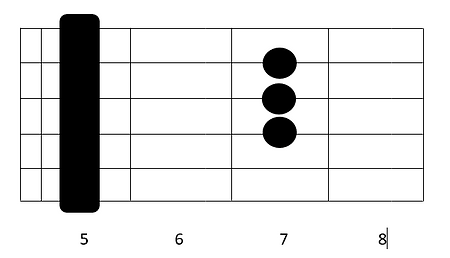D Major
To play a D major chord on the guitar, follow these steps:
-
Place your fingers:
-
Place your index (1st) finger on the 2nd fret of the G string (3rd string).
-
Place your middle (2nd) finger on the 2nd fret of the high E string (1st string).
-
Place your ring (3rd) finger on the 3rd fret of the B string (2nd string).
-
-
Strum the chord:
-
Strum from the D string (4th string) down to the high E string (1st string).
-
Make sure all strings ring clearly and there are no muted or buzzing sounds.
-
-
Check your fingers:
-
Ensure your fingers are positioned close to the frets for clean sound and that each string is pressed down firmly enough.
-
Here’s a simple diagram representing the D major chord on the guitar:
Playing the D major chord involves a bit of finger positioning and can take some practice to get all strings to ring clearly. If it's challenging at first, focus on placing your fingers precisely and applying enough pressure to the strings. With practice, you'll be able to switch to and from the D major chord smoothly.
To play a D major barre chord on the guitar, you typically use the "A shape" barre chord form. Here’s how to play it:
-
Position your index finger for the barre:
-
Place your index finger across all six strings at the 5th fret. This finger will act as a barre, pressing down on all the strings.
-
-
Form the chord shape with your other fingers:
-
Place your middle finger on the 7th fret of the A string (5th string).
-
Place your ring finger on the 7th fret of the D string (4th string).
-
Place your pinky finger on the 7th fret of the G string (3rd string).
-
-
Strum the chord:
-
Strum all six strings starting from the 6th string (low E string) down to the 1st string (high E string).
-
-
Check for clarity:
-
Listen to each string to ensure they are ringing clearly and there are no muted or buzzing sounds.
-
Here’s a simplified diagram showing the finger positions for the D major barre chord (A shape):
Playing barre chords can be challenging due to the need for finger strength and accuracy in barring all the strings with your index finger. It may take some time to build up the necessary strength and technique, so practice regularly and be patient with yourself. Once mastered, barre chords like the D major shape can be moved up and down the fretboard to play different chords.


